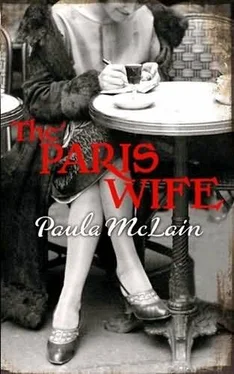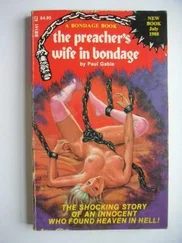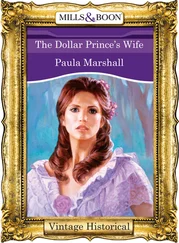Paula McLain - The Paris Wife
Здесь есть возможность читать онлайн «Paula McLain - The Paris Wife» весь текст электронной книги совершенно бесплатно (целиком полную версию без сокращений). В некоторых случаях можно слушать аудио, скачать через торрент в формате fb2 и присутствует краткое содержание. Жанр: Триллер, на английском языке. Описание произведения, (предисловие) а так же отзывы посетителей доступны на портале библиотеки ЛибКат.
- Название:The Paris Wife
- Автор:
- Жанр:
- Год:неизвестен
- ISBN:нет данных
- Рейтинг книги:5 / 5. Голосов: 1
-
Избранное:Добавить в избранное
- Отзывы:
-
Ваша оценка:
- 100
- 1
- 2
- 3
- 4
- 5
The Paris Wife: краткое содержание, описание и аннотация
Предлагаем к чтению аннотацию, описание, краткое содержание или предисловие (зависит от того, что написал сам автор книги «The Paris Wife»). Если вы не нашли необходимую информацию о книге — напишите в комментариях, мы постараемся отыскать её.
No twentieth-century American writer has captured the popular imagination as much as Ernest Heminway. This novel tells his story from a unique point of view – that of his first wife, Hadley. Through her eyes and voice, we experience Paris of the Lost Generation and meet fascinating characters such as Scott and Zelda Fitzgerald, Gertrude Stein, Ezra Pound, and Gerald and Sara Murphy. The city and its inhabitants provide a vivid backdrop to this engrossing and wrenching story of love and betrayal that is made all the more poignant knowing that, in the end, Hemingway would write of his first wife, "I wish I had died before I loved anyone but her."
The Paris Wife — читать онлайн бесплатно полную книгу (весь текст) целиком
Ниже представлен текст книги, разбитый по страницам. Система сохранения места последней прочитанной страницы, позволяет с удобством читать онлайн бесплатно книгу «The Paris Wife», без необходимости каждый раз заново искать на чём Вы остановились. Поставьте закладку, и сможете в любой момент перейти на страницу, на которой закончили чтение.
Интервал:
Закладка:
“You can have my liver when I’m done with it,” Ernest joked with them. “But not tonight.”
Prohibition had been in full swing when we left the States, and though we’d never stopped drinking-who had?-it was a relief to be able to buy and enjoy liquor openly. We ordered Pernod, which was green and ghoulish looking once you added the water and sugar, and tried to concentrate on that instead of our dinner, which was a disappointing coq au vin with grayish coins of carrot floating in the broth.
“It doesn’t feel right to be so far from home at Christmas. We should have a proper tree and holly and a fat turkey roasting in the oven,” I said.
“Maybe,” he said. “But we have Paris instead. It’s what we wanted.”
“Yes,” I said. “But we’ll go home again someday, won’t we?”
“Of course we will,” he said, but his eyes had darkened with something-recollection or anxiety. “First we have to find a way to make it here. Do you think we can?”
“Of course,” I bluffed.
Out the café window, the streets were dim and the only passing thing was a horse pulling a tank wagon full of sewage, the cart’s wheels throwing spliced shadows.
He signaled the waiter over to order us two more Pernods, and we got down to serious drinking. By the time the café closed, we were so tight we had to hold on to one another for balance as we walked. Uphill was infinitely harder than down, particularly in our state, but we managed in our slow way, stopping to rest in doorways, sometimes sharing a sloppy kiss. This was something you could do in Paris without drawing much attention.
At home, we were both sick, one after another, in the chamber pot. The dance hall was still roaring with drunks when we went to bed; the accordion had risen to a fever pitch. We nuzzled forehead to forehead, damp and nauseous, keeping our eyes open so the world wouldn’t spin too wildly. And just as we were falling asleep, I said, “We’ll remember this. Someday we’ll say this accordion was the sound of our first year in Paris.”
“The accordion and the whores and the retching,” he said. “That’s our music.”
It rained for much of January, and once that passed, winter in Paris was stingingly cold and clear. Ernest had believed he could write anywhere, but after a few weeks of working in the cramped apartment, always aware of me, he found and rented a single room, very nearby, on rue Descartes. For sixty francs a month, he had a garret not much bigger than a water closet, but it was perfect for his needs. He didn’t want distractions and didn’t have any there. His desk overlooked the unlovely rooftops and chimney pots of Paris. It was cold, but cold could keep you focused, and there was a small brazier where he could burn bundles of twigs and warm his hands.
We fell into a routine, rising together each morning and washing without talking, because the work had already begun in his head. After breakfast, he’d go off in his worn jacket and the sneakers with the hole at the heel. He’d walk to his room and struggle all day with his sentences. When it was too cold to work or his thoughts grew too murky, he’d walk for long hours on the streets or along the prettily ordered paths of the Luxembourg Gardens. Along the Boulevard Montparnasse there was a string of cafés-the Dôme, the Rotonde, the Select-where expatriate artists preened and talked rot and drank themselves sick. Ernest felt disgusted by them.
“Why is it every other person you meet says they’re an artist? A real artist doesn’t need to gas on about it, he doesn’t have time. He does his work and sweats it out in silence, and no one can help him at all.”
I could certainly see how hanging around cafés all day wasn’t work, but I also wondered if everyone was as serious and inflexible about their craft as Ernest was. I imagined there were lots of other writers who worked in their own houses and could tolerate conversation at breakfast, for instance. Who managed to sleep through any given night without stewing or pacing or scratching at a notebook while a single candle smoked and wavered. I missed Ernest’s company all day, but he didn’t seem to miss mine, not while there was work to do. When he craved contact, he stopped in to visit the Cézannes and Monets at the Musée du Luxembourg, believing they had already done what he was striving for-distilling places and people and objects to their essential qualities. Cézanne’s river was thick and brown and realer for it. That’s what Ernest was after-and sometimes the going was achingly slow. Many days he came home looking exhausted, defeated, as if he’d been struggling with sacks of coal all day instead of with one sentence at a time.
When Ernest worked, I kept house for us, making the bed, sweeping and dusting and washing up the breakfast dishes. In the late morning, I’d take a market basket into the street and do our shopping, hunting for the best bargains. Even though it was on the Right Bank of the Seine and nowhere near our apartment, I liked to walk to Les Halles, the open-air market that was known as the Stomach of Paris. I loved the maze of stalls and stands with offerings more exotic than anything I’d ever seen back home. There was all manner of game, venison and boar and pyramids of soft, limp hares. Everything was displayed naturally, hooves and tusks and fur left intact so you knew just what you were looking at. Although it was disconcerting to know these creatures had recently been up and running in the nearby fields and farms, there was something almost beautiful in the sheer volume and variety of things on display, all edible in some form. I didn’t half know what to do with most of it-unplucked pheasant and goose, or the baskets of small dun-colored birds I couldn’t even identify-but I loved to look before gravitating toward the vegetable and fruit stalls. I always stayed much longer than I needed to, walking and admiring the bushels of leeks and parsnips, oranges and figs and thick-skinned apples.
But in the alleyways behind the marketplace, fruit and meat rotted in crates. Rats crawled; pigeons crowded and pecked each other savagely, trailing feathers and lice. This was reality, and though living with Ernest was giving me more tolerance for the real than ever before, it made me feel sick even so. It was like looking into the gutters at the Place de la Contrescarpe, where colored dyes ran freely from the flower vendors’ carts: brief false lushness, and ugliness underneath. What had Ernest said way back when in Chicago? Love is a beautiful liar? Beauty was a liar, too. When I saw the rats the first time, I wanted to drop my basket where it was and run away, but we weren’t rich enough for symbolic gestures. So I walked.
From the wasted alleyways threading out from Les Halles, I walked toward the Seine. At the edge of the Pont Neuf, the quay was harsh and imposing. A cold wind sliced through my thin coat, but just beyond was the Île St.-Louis with the beautifully preserved houses and elegant streets that made it an oasis. I walked all the way along the island until I found a park at the tip, thick with bare chestnut trees, and then followed a little staircase down to the river. Fishermen were stringing their lines for goujon and frying them up on the spot. I bought a handful wrapped in newspaper and sat on the wall watching the barges move under Pont Sully. The nest of fish was crisp under a coarse snow of salt and smelled so simple and good I thought it might save my life. Just a little. Just for that moment.
THIRTEEN
It’s so beautiful here it hurts,” Ernest said one evening as we walked to take our evening meal at the café we now frequented on rue des Saints-Pères. “Aren’t you in love with it?”
I wasn’t, not yet-but I was in awe of it. To walk the best streets in Paris just then was like having the curtained doors of a surreal circus standing open so you could watch the oddity and the splendor at any hour. After the enforced austerity of the war, when the textile industry collapsed and the great couturiers nailed their doors shut, brightly colored silks now ran through the streets of Paris like water-Persian blues and greens, startling oranges and golds. Inspired by the orientalism of the Ballets Russes, Paul Poiret dressed women in culotte harem pants and fringed turbans and ropes and ropes of pearls. In sharp contrast, Chanel was also beginning to make her mark, and you saw splashes of sharp, geometric black amid all that color. More and more, chic meant a shingle-bob and deeply lacquered nails and impossibly long ivory cigarette holders. It also meant lean and hungry looking-but that wasn’t me. Even when I was hungry, I never lost my round face and my plump arms. I also didn’t care enough about clothes to do any thinking about what would suit me. I wore what was easiest and required the least maintenance, long wool skirts and shapeless sweaters and wool cloche hats. Ernest didn’t seem to mind. If anything, he thought highly costumed women were ridiculous. It was part of the way he favored everything simple-good, straightforward food, rustic and almost chewy wine, peasant people with uncomplicated values and language.
Читать дальшеИнтервал:
Закладка:
Похожие книги на «The Paris Wife»
Представляем Вашему вниманию похожие книги на «The Paris Wife» списком для выбора. Мы отобрали схожую по названию и смыслу литературу в надежде предоставить читателям больше вариантов отыскать новые, интересные, ещё непрочитанные произведения.
Обсуждение, отзывы о книге «The Paris Wife» и просто собственные мнения читателей. Оставьте ваши комментарии, напишите, что Вы думаете о произведении, его смысле или главных героях. Укажите что конкретно понравилось, а что нет, и почему Вы так считаете.












